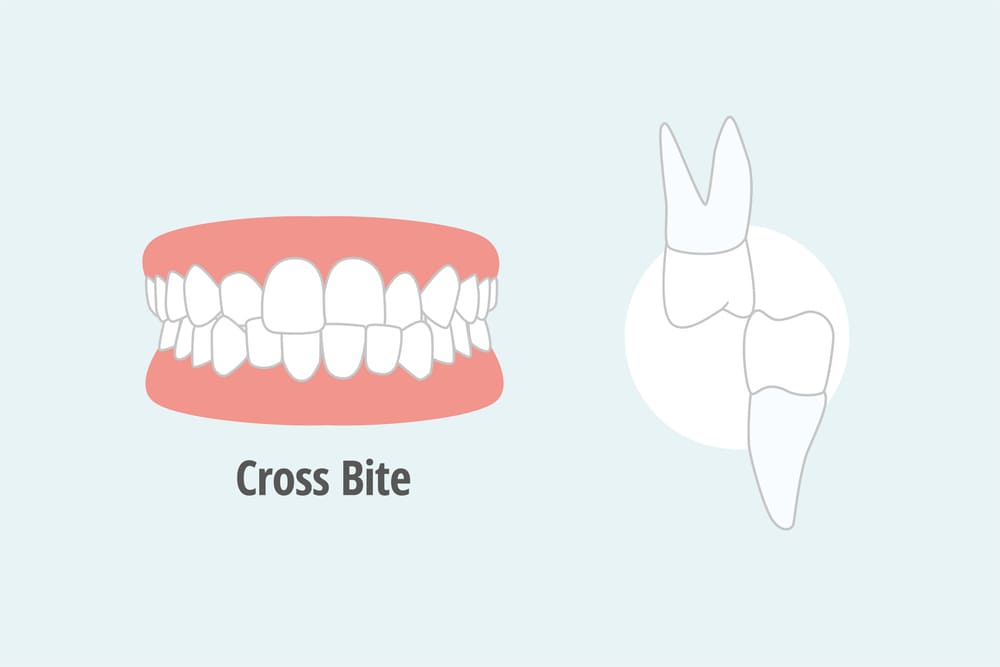Smiling without being conscious and living without having chewing problems is something so little you could ask for! But not everyone is blessed with this luxury. Some people are born with teeth and jaw misalignment issues like crossbite.
What Is a Crossbite?
A crossbite is a type of malocclusion, which is a misalignment of the teeth. When you have a crossbite, your upper teeth fit behind your lower teeth instead of in front of them. This can happen in the front or back teeth, and it can affect one or both jaws.
What Are Different Types of Crossbite?
There are two different types of crossbites:
-
Anterior Crossbite
Commonly known as an underbite, anterior crossbite is a condition where your upper front teeth overlap your lower front teeth, making your chin and jaw look abnormal. Crowded teeth and mouth breathing are a few reasons that cause an underbite.
-
Posterior Crossbite
In a posterior crossbite, your back teeth are affected. In this condition, the lower teeth at the back of your mouth overlap the teeth in your top jaw. A posterior crossbite is caused by the same reasons a anterior crossbite is caused, but sometimes it may also be because of the late falling of your baby teeth.
Also Read: Buck Teeth (Overbite) -All You Need to Know From Causes to Treatments
What Are The Symptoms Of A Crossbite?
If you are wondering, do i have a crossbite? You should check for following symptoms:
- Difficulty closing your mouth completely, so your upper and lower teeth don’t touch properly.
- Problems with speech, such as lisping or difficulty speaking clearly.
- Accidentally biting the inside of your cheek or lip while eating or talking.
- Experiencing severe headaches.
- Feeling pain in your teeth or a specific tooth.
- Jaw pain.
What Causes A Crossbite?
There are several causes of a crossbite; some of them include:
- Genetics
- Prolonged thumb-sucking
- Tongue-thrusting
- Missing teeth
- Bad chewing habits
- Use of pacifiers or bottles past infancy
- Poor matched teeth and jaw
- A mouth or jawbone injury
- Delayed loss of baby teeth
- Unexpected permanent teeth eruption
What Problems Can An Untreated Crossbite Create?
Untreated crossbite can cause some of the following issues:
Chipped Tooth
When your teeth constantly collide against each other, it can accidentally chip your teeth.
Gum Disease
Constant rubbing of teeth against each other can destroy the enamel of your teeth and cause cavities which further leads to gum disease.
Gum Recession
Collison of teeth can cause your gum to recede and vulnerable to decay and infection.
TMJ Disorder
Crossbite can also cause painful TMJ disorder.
How to Fix a Crossbite in Kids?
Thankfully you can fix crossbite problems in kids with either of the following treatments:
-
Palate Expander
With the help of a palate expander, you can extend the upper palate of your mouth. It raises the upper jaw to let the lower teeth fit perfectly with the upper teeth. Palate expander is best and easier to use on kids and teenagers as their jaws are growing.
-
Braces Treatment
Braces treatment is effective and the most preferred treatment to correct a dental crossbite and various other kinds of bite problems. Someone as young as a seven-year child can also be treated for crossbite through braces. Braces as used as an appliance to correct the positioning of your teeth and jaw.
How To Fix a Crossbite in Teenagers and Adults?
There are several cross bite treatment options available for adults and teenagers to find relief from their crossbite problem
Jaw Realignment Surgery
In serious crossbite cases, where braces or Invisalign fails to work, your orthodontist may recommend jaw realignment surgery to correct the position of your jaw.
To fix crossbite without surgery, below are the options available:
Braces
Traditional braces for crossbite treatment would be the most effective method for treating all forms of crossbite. Along with dental correction, braces successfully achieve skeletal realignment if you pair them with expanders, elastics, and other appliances. However, the one downside to braces is they are visible, and most adults prefer more discreet treatments. But if visibility is not an issue for you, braces are an excellent solution.If you have a crossbite due to the misalignment of jaws or teeth, you may be required to wear a palatal expander before wearing braces. It widens your upper jaw, resulting in moving the upper and lower arches to move to the desired position before making space for braces to finish the alignment process.
Now you may wonder, can you fix a crossbite without braces? The answer is yes. Below are some listed ways you can fix crossbite without braces
Invisalign
Another Way of fixing a crossbite is Invisalign. An Invisalign is a clear and removable teeth aligner that gets your job done just like braces – the only difference is that these are not visible and can be removed before eating. You need to visit your dentist for Invisalign frequently. They can be fitted with additional appliances that are used for targeting crossbite.
Elastics
This supportive treatment involves placing elastic rubber bands across your teeth to pressurize them and make appropriate space.
Bottom Line
Dental Crossbite is a bite problem that can be treated with these treatments easily! Book an appointment today with Thurman Orthodontics – a trusted orthodontic clinic in Fresno, and forget your crossbite problems.
FAQs
-
Can invisalign fix crossbite?
Yes, Invisalign can fix most of all mild to moderate cases of crossbite
-
Crossbite vs Overbite? What’s the difference?
Crossbite refers to the misalignment where the upper teeth sit inside or behind the lower teeth, while overbite refers to the vertical overlap of the upper front teeth over the lower front teeth.
-
Can a crossbite fix itself?
Unfortunately, a crossbite doesn’t usually fix itself on its own. To get your teeth aligned properly, you’ll need to see a dentist or orthodontist who can discuss treatment options with you.
-
How long does it take to fix a crossbite?
The time to fix a crossbite depends entirely on your situation. The severity of the misalignment and the treatment method your dentist chooses will determine the timeline. Orthodontic options like braces or clear aligners can take anywhere between a few months and several years. In some complex cases, surgery might be required, and that would involve a longer recovery period.

Dr. Brian Thurman has spent his entire life enjoying all the beauty that California has to offer. A Fresno native, he still escapes to the ocean or the mountains whenever his busy schedule allows. Driven by his love for natural beauty, Dr. Thurman enjoys creating beautiful smiles and healthy bites that last a lifetime. He is proud to be the only Ivy League trained Orthodontist in the Fresno/Clovis area.

